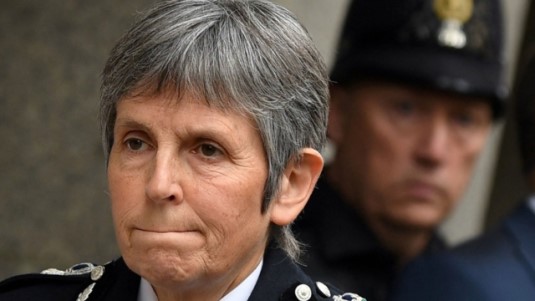Cressida Dick's Resignation

In all likelihood, no. But it's good to see Dick heading for the door anyway. This was a resignation long overdue. I'm not about to recapitulate her record in depth, but the lowlights of her career, which include overseeing the operation that killed Jean Charles de Menezes, throwing road block after obstruction after blockage in the way of the Daniel Morgan investigation, covering for institutional racism and, perversely, the culture of institutionalised misogyny that saw Wayne Couzens pass undetected in police ranks while dishing out beatings at the Sarah Everard vigil, and her studied refusal to investigate breaches of Covid rules in Downing Street until it was suspiciously convenient for Johnson, all point to a character who understood what policing is about.
As one rises up the ranks, each rung on the career ladder becomes increasingly political. It goes from banging up the bad guys and cracking heads on marches, to reach out activities that legitimate the police (what school assembly hasn't received a visit from a friendly, relatable copper?), to hobnobbing with local politicians and, if one's office warrants it, metro mayors and heads of governments. In addition to respective police forces, there is a growing and increasingly powerful constellation of institutional interests behind leading officers, which more or less reflects the three functions of policing. The National Crime Agency coordinates activity against trafficking (drugs, weapons, people), cross-border cases, cybercrime and complex fraud, and the "glamorous stuff" like serial killers and high profile crimes. This is the arm concerned with villainy, traditionally conceived. The College of Policing works at legitimating the police as a skilled profession, offering guidance on conduct, and is responsible for accrediting policing degrees at British universities. And the National Police Chief's Council is the political arm of the police, acting as a lobbyist of government (usually for more repressive legislation and better funding settlements) and advisor on policing and counter-terrorism matters. In the classical Weberian sense, they work together as a status group to promote the police in competition with other professional interests to improve their "market situation", as the old language has it. But the police aren't just another occupation looking for prestige and award, they are a key pillar of the state's repressive apparatus, the civilian-facing arm of institutionalised, organised violence.
Those who succeed in the police are the ones that instinctively or consciously grasp this fact. "Maintaining the peace" is, in the last instance, a class peace. Public order is a synonym for bourgeois order. The thin blue line is the ticker tape around private property, and happily wades into demonstrations and protests, batons aloft, regardless of the issue. If the Tories are hyper aware enough to clamp down on anything that offers a bit of political hope, the police know jumping on collective action with their size nines, and kettling protesters for seemingly no reason are techniques designed to have similar effects: a nipping in the bud of anything that might flower into mass mobilisation and challenge the status quo.
None of us know who Dick's successor is going to be, but they too will be a creature of this infernal machine. They will defend the Met by deflecting criticism, mollifying racism and sexism, papering over its failures, furthering the government's authoritarian politics and, in all aspects, carry on being the same institution it was before Dick handed in her notice. A change of face does not mean a change of purpose, but from an establishment point of view it draws a line under what went before and allows them to start afresh, as if the corruption, violence, cronyism and protection of privilege isn't a structural characteristic.
Image Credit